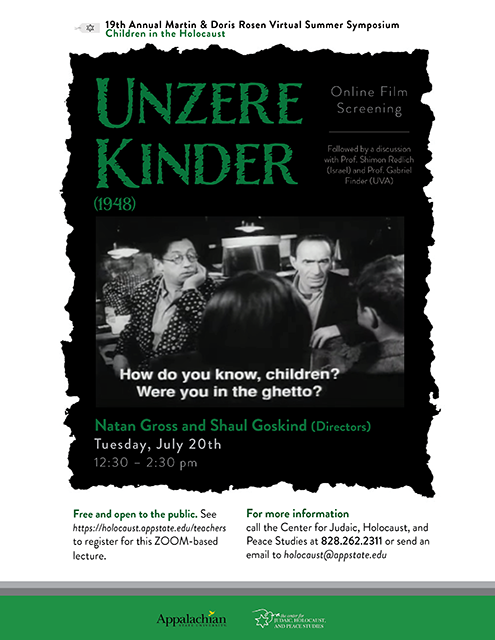Summer Symposium on the Holocaust Screens 1948 Film Unzere Kinder Followed by Discussion with Child Survivor and Cast Member Shimon Redlich live from Israel (Tues., July 20)
 The Center for Judaic, Holocaust, and Peace Studies invites the public to an online screening of the Polish Yiddish-language film Unzere Kinder (1948), one of the first films on the Holocaust, by directors Nathan Gross and Shaul Goskind. The screening will begin on Tuesday, July 20, at 12:30 pm EST. At 1:45 pm, the screening is followed by a discussion of the film between Prof. Emeritus Shimon Redlich (Israel), a child survivor who also starrs in the production, and Prof. Gabriel Finder (UVA), a specialist in modern Polish-Jewish and Holocaust history. The event is part of the 19th Annual Martin and Doris Rosen Summer Symposium organized and hosted by Appalachian State University’s Center for Judaic, Holocaust, and Peace Studies. The Center for Judaic, Holocaust, and Peace Studies invites the public to an online screening of the Polish Yiddish-language film Unzere Kinder (1948), one of the first films on the Holocaust, by directors Nathan Gross and Shaul Goskind. The screening will begin on Tuesday, July 20, at 12:30 pm EST. At 1:45 pm, the screening is followed by a discussion of the film between Prof. Emeritus Shimon Redlich (Israel), a child survivor who also starrs in the production, and Prof. Gabriel Finder (UVA), a specialist in modern Polish-Jewish and Holocaust history. The event is part of the 19th Annual Martin and Doris Rosen Summer Symposium organized and hosted by Appalachian State University’s Center for Judaic, Holocaust, and Peace Studies.The screening and discussion are free and open to the public. To register for this screening and discussion, please click here.
Unzere Kinder is a semi-documentary film that features the comedy duo Israel Shumacher and Shimon Dzigan, who had returned to Poland from the Soviet Union, where they had fled to escape the reach of the Nazi state, and Jewish children who had survived the Shoah. The film was shot on location in an orphanage and school near Lodz shortly after the end of the Shoah. The film included Shumacher's and Dzigan's memorable performance as all the characters in Sholem Aleichem's "Kasrilevke brent" (Krasrilvke is burning) followed by an exchange of roles where they are turned into the children's audience. These reversals continue during the performers' visit to the children's orphanage and school, as the children, including child survivors of the Shoah, teach adults in this production that explores the "healing possibilities of song, dance, and storytelling." The film was attacked by Poland's postwar Communist government as too "pro-Zionist" and presumed lost for more than three decades. The film has been restored by The National Center for Jewish Film and given complete new English subtitles. Shimon Redlich is one of the child survivors who is featured in the film. Born in Lviv, present-day Ukraine, in 1935, Redlich and his family moved to the formerly Polish, now Ukrainian town of Brzezany, where they resided when the Germans attacked the Soviet Union. In 1943, his father was murdered in a round-up and the rest of the family went into hiding. Shimon Redlich and his mother survived with the help of a Polish and, subsequently, a Ukrainian family, whose members provided food and shelter. After liberation, he participated in the shooting of the 1948 semi-documentary film “Our Children” (undzer kinder). In 1950, he left Poland for Israel, where Redlich earned a BA at Hebrew University. He continued his education in the U.S., receiving an MA from Harvard and a PhD from NYU. As a specialist in the modern history of Jews in Eastern Europe, Russia and the USSR, Redlich returned to Israel and accepted a teaching appointment at Ben Gurion University in 1972. He retired as a full professor in 2003. Redlich has published a number of books, including the edited collection War, Holocaust and Stalinism: A Documented Study of the Jewish Anti-Fascist Committee in the USSR (1995) and Together and Apart in Brzezany: Poles, Jews, and Ukrainians, 1919-1945 (2002), which combines extensive interviews he conducted in Israel, the U.S., Poland and Ukraine with trial documents and his own memories of his time in the city. He currently lives in Modi’in, Israel. On Tuesday, July 20, at 11:30 am EST, Shimon Redlich also gives a full-length testimony about his survival in Nazi-occupied Poland. Use the same registration link as for the film screening to join us. For more information about the screening, subsequent discussion or the symposium, please contact the Center at 828.262.2311 or holocaust@appstate.edu. |